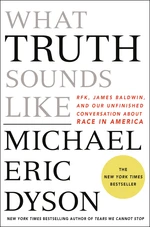Named a 2018 Notable Work of Nonfiction by The Washington Post NOW A NEW YORK TIMES BESTSELLER ⢠Winner, The 2018 Southern Book Prize NAMED A BEST/MOST ANTICIPATED BOOK OF 2018 BY: Chicago Tribune ⢠Time ⢠Publisher's Weekly A stunning follow up to New York Times bestseller Tears We Cannot Stop The Washington Post: "Passionately written." Chris Matthews, MSNBC: "A beautifully written book." Shaun King: âI kid you notâI think itâs the most important book Iâve read all year...â Harry Belafonte: âDyson has finally written the book I always wanted to read... a tour de force.â Joy-Ann Reid: A work of searing prose and seminal brilliance... Dyson takes that once in a lifetime conversation between black excellence and pain and the white heroic narrative, and drives it right into the heart of our current politics and culture, leaving the reader reeling and reckoning." Robin D. G. Kelley: âDyson masterfully refracts our present racial conflagration... he reminds us that Black artists and intellectuals bear an awesome responsibility to speak truth to power." President Barack Obama: " Everybody who speaks after Michael Eric Dyson pales in comparison.â In 2015 BLM activist Julius Jones confronted Presidential candidate Hillary Clinton with an urgent query: âWhat in your heart has changed thatâs going to change the direction of this country?â âI donât believe you just change hearts,â she protested. âI believe you change laws.â The fraught conflict between conscience and politics â between morality and power â in addressing race hardly began with Clinton. An electrifying and traumatic encounter in the sixties crystallized these furious disputes. In 1963 Attorney General Robert Kennedy sought out James Baldwin to explain the rage that threatened to engulf black America. Baldwin brought along some friends, including playwright Lorraine Hansberry, psychologist Kenneth Clark, and a valiant activist, Jerome Smith. It was Smithâs relentless, unfiltered fury that set Kennedy on his heels, reducing him to sullen silence. Kennedy walked away from the nearly three-hour meeting angry â that the black folk assembled didnât understand politics, and that they werenât as easy to talk to as Martin Luther King. But especially that they were more interested in witness than policy. But Kennedyâs anger quickly gave way to empathy, especially for Smith. âI guess if I were in his shoesâ¦I might feel differently about this country.â Kennedy set about changing policy â the meeting having transformed his thinking in fundamental ways. There was more: every big argument about race that persists to this day got a hearing in that room. Smith declaring that heâd never fight for his country given its racist tendencies, and Kennedy being appalled at such lack of patriotism, tracks the disdain for black dissent in our own time. His belief that black folk were ungrateful for the Kennedysâ efforts to make things better shows up in our day as the charge that black folk wallow in the politics of ingratitude and victimhood. The contributions of black queer folk to racial progress still cause a stir. BLM has been accused of harboring a covert queer agenda. The immigrant experience, like that of Kennedy â versus the racial experience of Baldwin â is a cudgel to excoriate black folk for lacking hustle and ingenuity. The questioning of whether folk who are interracially partnered can authentically communicate black interests persists. And we grapple still with the responsibility of black intellectuals and artists to bring about social change. What Truth Sounds Like exists at the tense intersection of the conflict between politics and prophecy â of whether we embrace political resolution or moral redemption to fix our fractured racial landscape. The future of race and democracy hang in the balance.
Price history
Oct 25, 2021
€12.50

